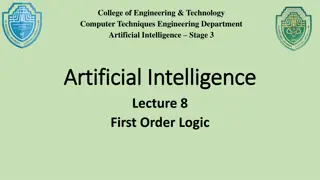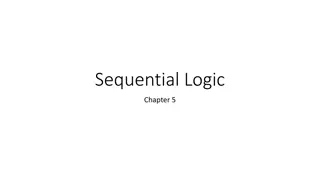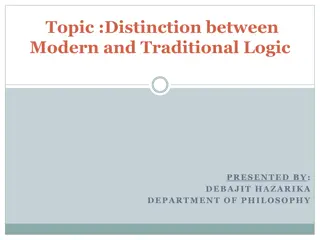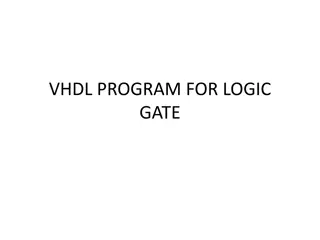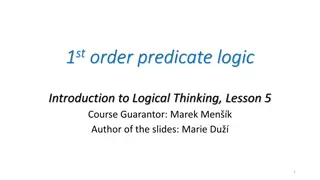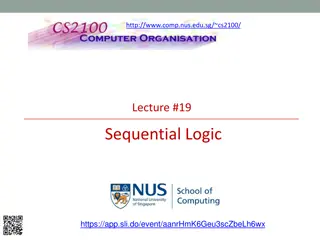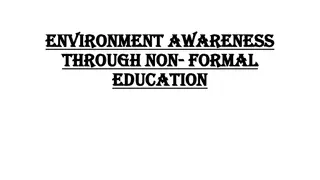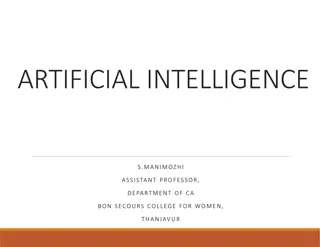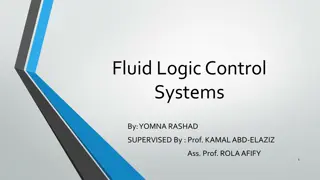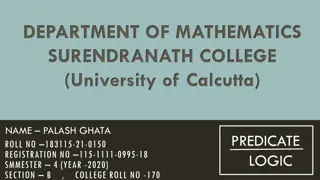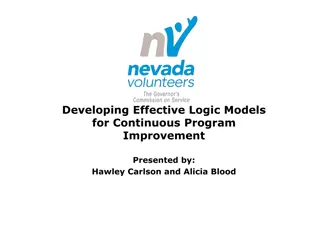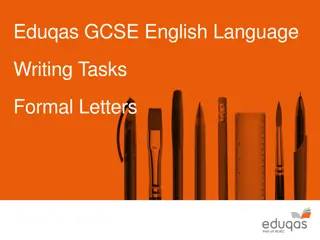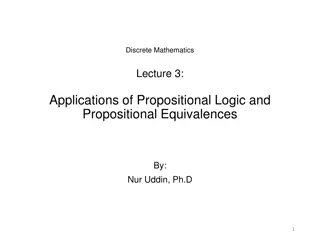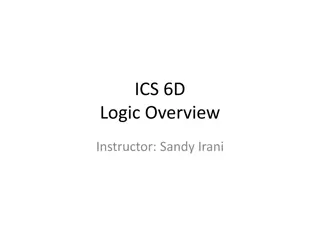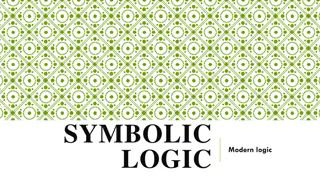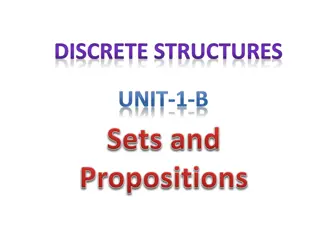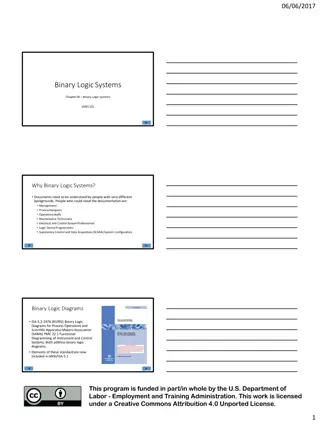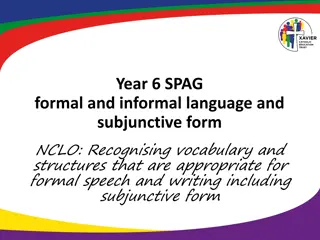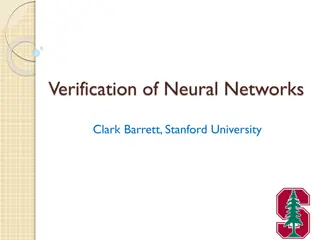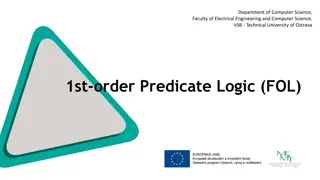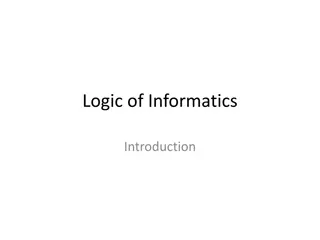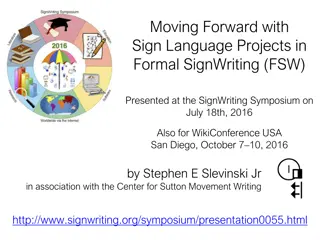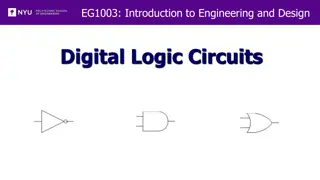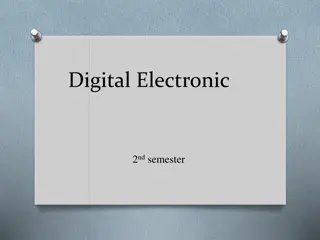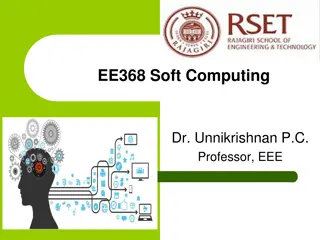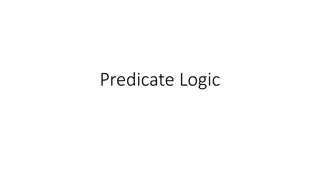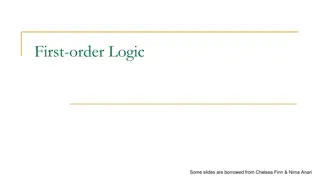Sustainable Fashion Solutions for Repurposing Formal Wear
Transforming formal wear from single-use items into sustainable fashion solutions is vital for reducing textile waste and environmental impact. This article explores the challenges of post-party formal dresses, the environmental consequences of textile waste, and innovative approaches to upcycling d
9 views • 14 slides
Mastering Formal Letter Writing in Education
Enhance your formal letter writing skills in education with a focus on job applications and key features of formal correspondence. Explore the purposes of writing letters and learn to choose the appropriate writing style for each type. Practice completing expressions for formal letters effectively.
5 views • 27 slides
Understanding First-Order Logic in Artificial Intelligence
Delve into the realm of first-order logic in artificial intelligence as a knowledge-based agent represents and deduces actions in its operating world. Explore the limitations of propositional logic and the expressive power of first-order logic, along with syntax, semantics, and models in logical lan
3 views • 27 slides
Understanding Sequential Logic Circuits in Digital Systems
Logic circuits in digital systems can be either combinational or sequential. Sequential circuits utilize storage elements along with logic gates, where outputs depend not only on present inputs but also on past inputs and internal states. They are essential building blocks, with storage registers pl
5 views • 20 slides
Topic : Distinction between Modern and Traditional Logic.
Logic, as a normative study, focuses on distinguishing correct reasoning from incorrect. Traditional logic, based on Aristotle's work, emphasized syllogistic reasoning, while modern logic, pioneered by figures like Leibnitz and Russell, employs mathematical methods and symbolic logic for a more adva
2 views • 10 slides
Logic Families
Logic families such as Diode Logic (DL), Resistor-Transistor Logic (RTL), and Diode-Transistor Logic (DTL) each have distinct capabilities and limitations when it comes to performing logic functions. While DL gates are simple and inexpensive but limited in functionality, RTL gates offer both normal
1 views • 22 slides
VHDL Logic Gate Programming Examples
This content provides VHDL code examples for various logic gates including AND, OR, NOT, XOR, and X-NOR gates along with their corresponding circuit diagrams. Each code snippet is accompanied by a brief explanation and a visual representation of the logic operation. The provided VHDL code can be uti
0 views • 7 slides
Introduction to 1st Order Predicate Logic in Logical Thinking
Explore the limitations of propositional logic and the enhanced expressive power of 1st order predicate logic (PL1). Understand how PL1 allows for analyzing the structure of atomic propositions and proving arguments that depend on these structures. Through examples and valid argument schemata, delve
1 views • 26 slides
Understanding Sequential Logic in NUS CS2100 Lecture #19
Explore the concepts of sequential logic in Lecture #19 by Aaron Tan at NUS, covering memory elements, latches, flip-flops, asynchronous inputs, synchronous sequential circuits, and different types of sequential circuits. Delve into the distinction between combinatorial and sequential circuits, memo
3 views • 26 slides
Enhancing Environmental Awareness Through Non-Formal Education Initiatives
Non-formal education plays a crucial role in enhancing environmental awareness through programs such as eco-clubs, population education initiatives, and the National Green Corps. These initiatives aim to educate individuals, especially children, about environmental issues, leading to better decision
0 views • 7 slides
Understanding Predicate Logic in Artificial Intelligence
In the world of artificial intelligence, predicate logic plays a crucial role in representing simple facts. It involves syntax, semantics, and inference procedures to determine the truth value of statements. Real-world facts are represented using propositions in logic, allowing for structured knowle
1 views • 19 slides
Introduction to Fluid Logic Control Systems
Fluid logic control systems utilize devices that switch fluid, like air, between outlets, providing ON/OFF outputs swiftly based on control signals. This article explores moving-part logic devices, control functions, Boolean algebra applications in control technology, and advantages of fluid logic s
1 views • 22 slides
Understanding Logic Circuits in Aircraft Systems
Aircraft logic systems follow MIL/ANSI standard logic symbols and conventions used in electronic applications. Inverters, buffers, AND gates, OR gates, NAND gates, NOR gates, Exclusive-OR gates, and Exclusive-NOR gates are commonly used in aircraft logic circuits. These gates have specific behaviors
0 views • 52 slides
Introduction to Predicate Logic in Mathematics
Predicate logic is a powerful tool used in mathematics to express complex relationships and assertions that cannot be adequately represented by propositional logic. It allows for the quantification of statements over a range of elements using predicates and quantifiers like universal and existential
1 views • 13 slides
Developing Effective Logic Models for Continuous Program Improvement
Explore the essentials of logic models and their significance in evaluating programs for continuous improvement, presented by Hawley Carlson and Alicia Blood. Learn about theory of change, logic model components, and using logic models for evaluation planning.
4 views • 12 slides
Mastering Formal Letter Writing: Tips and Examples for Success
Explore the art of formal letter writing with this comprehensive presentation covering the fundamentals of planning, content, features, and layout. Learn how to address the audience, define the purpose, structure your letter effectively, and craft the right tone. Discover essential tips for opening
0 views • 22 slides
Applications and Equivalences in Propositional Logic
This lecture explores applications of propositional logic, including translating sentences, system specifications, logic puzzles, and logic circuits. It also defines tautology, contradiction, and contingency as types of compound propositions, along with logical equivalences. Examples and illustratio
0 views • 16 slides
Understanding Formal Semantics of Programming Languages: From Lambda Calculus to Separation Logic
Explore the foundational concepts of formal semantics in programming languages, covering Lambda Calculus, Untyped and Simply-typed languages, Imperative languages, Operational and Hoare logics, as well as Separation logic. Delve into syntax, reduction rules, typing rules, and operational semantics i
7 views • 14 slides
Understanding Logic in Mathematics and Computer Science
Logic is a branch of mathematics that deals with true or false values. It is essential for fields like computer science, aiding in AI, automated reasoning, and digital logic design. Propositions, logical operations like conjunction and disjunction, and the use of propositional variables are fundamen
0 views • 28 slides
Understanding Propositional Logic and Logical Operators
Learn about propositional logic, statements, logic operators, compound statements, exclusive-or, logical equivalence, and writing logical formulas for truth tables. Explore how to create compound statements for exclusive-or using different approaches and ensure logical equivalence. Enhance your know
0 views • 26 slides
Understanding Symbolic Logic: A Modern Approach
Delve into the world of symbolic logic where traditional and modern approaches differ. Learn how symbolic languages help overcome challenges with natural languages, leading to a clearer understanding of deductive reasoning through the analysis of premises, conclusions, compound statements, and logic
1 views • 32 slides
Understanding Propositional Logic at Kwame Nkrumah University
Dive into the world of symbolic logic and compound statements with a focus on Propositional Logic at Kwame Nkrumah University in Ghana. Explore the concepts of connectives, simple and compound statements, truth values, and more. Enhance your logical reasoning skills through a tutorial on symbolic lo
0 views • 57 slides
Understanding Propositional Logic and Mathematical Logic in Computer Science
Study the development of formal logic in computer science, focusing on propositional logic and mathematical logic. Learn about propositions, logical operators, and ways of combining statements to derive conclusions. Explore examples and understand how to determine the validity of arguments using log
0 views • 38 slides
Satisfiability Modulo Abstraction for Separation Logic with Linked Lists
This study explores the application of satisfiability modulo abstraction in separation logic with linked lists. It presents a technique using abstract interpretation concepts to handle separation logic formulas beyond previous methods, specifically focusing on over-approximating heaps that satisfy t
0 views • 41 slides
Understanding Formal Invitation Card Etiquette
Formal invitations play a significant role in conveying important event details and setting the tone for the occasion. They provide complete information including the occasion, names of hosts and invitees, date, time, venue, and more. The format of formal invitations follows specific guidelines, usi
0 views • 16 slides
Understanding Binary Logic Systems in Documentation
Binary logic systems play a crucial role in documentation for individuals with diverse backgrounds such as management, process designers, operations staff, maintenance technicians, and more. These systems, depicted in binary logic diagrams, provide a clear and concise representation for various prof
4 views • 16 slides
Understanding Formal and Informal Language with Subjunctive Form
Explore the distinctions between formal and informal language, along with the appropriate usage of the subjunctive form. Learn how to enhance your writing by identifying key vocabulary and structures for formal speech and writing. Get insights on recognizing and utilizing formal language in various
0 views • 9 slides
Introduction to Symbolic Logic: Understanding Logical Inferences
Logic is the study of reasoning methods to distinguish between correct and incorrect arguments. Symbolic Logic involves representing logic symbolically for easier understanding and manipulation. Logical inferences help in making decisions based on reasoning chains. The content discusses the use of l
1 views • 28 slides
Software Bugs and Formal Verification in Critical Systems
Software bugs have caused catastrophic events like radiation overdoses and rocket explosions, emphasizing the importance of formal verification in ensuring software correctness. Formal verification uses mathematical models to prove software correctness, offering higher assurance, especially in safet
1 views • 26 slides
UBU Performance Oversight Engagement Framework Overview
Providing an overview of the UBU Logic Model within the UBU Performance Oversight Engagement Framework, this session covers topics such as what a logic model is, best practice principles, getting started, components of the logic model, evidence & monitoring components, and next steps. The framework
0 views • 33 slides
Understanding First-Order Predicate Logic in Computer Science Education
Exploring the concepts of first-order predicate logic in computer science, this content delves into the formal language, grammar, and logical form of arguments. It covers the importance of moving beyond propositional logic, introduces valid schemata, and illustrates the structure of atomic and compo
0 views • 23 slides
Evolution of Logic in Informatics and Computer Science
Explore the journey of logic from philosophical debates in ancient times to its crucial role in computer science today. From symbolic logic to mathematical foundations, discover how logic has shaped the development of formal systems and applications in various fields within the realm of informatics
0 views • 34 slides
Exploring Formal SignWriting in Sign Language Projects
Delve into the world of Formal SignWriting (FSW) as presented at the SignWriting Symposium in 2016 by Stephen E. Slevinski Jr. Discover how FSW, supported by the Center for Sutton Movement Writing, offers a formal language system for sign languages with stable standards and diverse implementations.
0 views • 29 slides
Guidelines for Writing Effective Formal Letters
Learn about the types of formal letters, elements of a successful letter, paragraph planning tips, and the style to use in formal letters. Understand how to structure letters of complaint effectively, including the importance of clarity, justification, and clear presentation of complaints and sugges
0 views • 15 slides
Understanding Digital Logic Circuits and Design Principles
Explore the world of digital logic circuits with a focus on logic gates, truth tables, boolean equations, and Karnaugh maps. Learn how to design combinational logic circuits, analyze different logic functions, and solve sample problems related to digital logic. Get hands-on experience with LabVIEW a
0 views • 28 slides
Introduction to Digital Electronic Circuits and Logic Gates
Understanding digital electronic circuits and logic gates is essential for building digital systems. This content covers the basics of logic gates, digital signals, and the practical application of binary digits in circuits. It discusses the function and importance of logic gates, such as NOT gates
0 views • 17 slides
Introduction to Logical Thinking: Science of Correct Reasoning
Logic, the science of correct reasoning, explores ways to infer conclusions from assumptions and validate arguments. This course introduces logic as a tool for analyzing arguments, automating processes, and enhancing communication clarity. Through classic logic variants like propositional and predic
0 views • 30 slides
Applications of Fuzzy Logic in Soft Computing
Fuzzy logic is primarily used as the underlying logic system for decision support systems in various applications. From fuzzy controllers to fuzzy rule bases, this technology enables approximate reasoning similar to human decision-making processes. Explore the architecture and major components of Fu
0 views • 27 slides
Understanding Predicate Logic and Quantifiers
Predicate logic extends propositional logic by allowing statements to be assigned specific values. The limitations of propositional logic are overcome through predicate logic, where statements like "?. is greater than 3" have subject and predicate parts denoted as ?(?). Furthermore, predicates can b
1 views • 20 slides
Understanding First-Order Logic Fundamentals
Explore the limitations of propositional logic and delve into the syntax, semantics, and inference rules of first-order logic. Learn about predicates, quantification, and how to express relationships among objects using predicates. Enhance your understanding of how first-order logic provides a more
0 views • 42 slides


